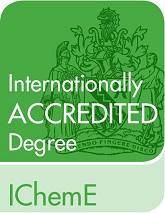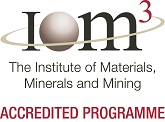Our students develop core scientific and engineering knowledge through practical laboratory experience, teamworking and problem solving. They have the technical training and transferable skills needed to pursue a career in chemical engineering with specialist expertise in environmental protection and sustainability.
Professional recognition

This degree has been accredited by the Institute of Chemical Engineers (IChemE) and IOM3 (Institute of Materials, Minerals and Mining) under licence from the UK regulator, the Engineering Council.
Accreditation is a mark of assurance that the degree meets the standards set by the Engineering Council in the UK Standard for Professional Engineering Competence (UK-SPEC).


An accredited degree will provide you with some or all of the underpinning knowledge, understanding and skills for eventual registration as an Incorporated (IEng) or Chartered Engineer (CEng).
Some employers recruit preferentially from accredited degrees, and an accredited degree is likely to be recognised by other countries that are signatories to international accords.
Year one
The department teaches a common first year across chemical engineering and environmental engineering courses. The transition between school/college and university is very carefully managed, with extensive staff support.
Year one takes students with backgrounds in science and maths and introduces the fundamental engineering sciences including heat and mass transfer and fluid mechanics. Safety and environmental aspects are also covered, as are the development of professional skills. The material is taught using a wide variety of methods, from problem-based learning to tutorials and laboratory classes.
At the end of year one you can elect to transfer to any of the courses offered by the department.
Year two
The focus of year two is to develop the fundamental engineering sciences into the key processes and operations that are common within chemical engineering, such as process control, separations and plant design. Environmental protection and management are significant components and a field course is undertaken. Exposure to industry and cutting-edge research also increases. Safety and environmental aspects are an important aspect of this year, allowing students to become more independent in their approach to learning.
Year three
In year three we develop the practical application of the knowledge and skills that have been gained in years one and two. Laboratory exercises are more open-ended, using large-scale and industrial equipment. Project management, business and finance are covered and there is a significant amount of input from industry. You will undertake specialised modules on environmental process engineering, concerned with the management of air and water pollution.
Year three students undertake a group design project, which simulates a commercial environment where companies tender for a design contract. Projects are industry driven and allow you to develop and demonstrate the skills and competencies necessary to be professional chemical engineers wishing to specialise in the environment.
Usually, students spend a year working in industry at the end of year three. The placement will allow you to gain first hand experience of the exciting challenges that are faced by chemical engineers, and will significantly enhance your technical engineering skills. The placements are fully paid, and companies usually visit the University from September to March to recruit students for industrial placements.
Year four
With the assistance of our dedicated team, you will spend your fourth year working in an industrial placement to expand and refine the skills you have built so far in the course.
Year five
Year five allows you to develop specialist expertise, with a range of module options available. You will be completely independent in your learning and will be able to tackle a wide variety of complex, multidisciplinary problems and more advanced chemical and environmental engineering concepts. A research and design project is undertaken, giving you first-hand experience in cutting-edge research and the opportunity to develop the more advanced skills that set masters level students apart from other graduates.